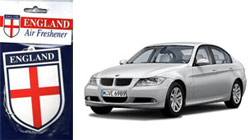 The English approach to nationalism is very odd. There is no British car manufacturer any more after MG Rover closed. UK firm BAE Systems wants to sell its share of Airbus and few people seem to care – the French would never sanction such a sale in the current climate of economic patriotism. So how else should this nationalism manifest itself?
The English approach to nationalism is very odd. There is no British car manufacturer any more after MG Rover closed. UK firm BAE Systems wants to sell its share of Airbus and few people seem to care – the French would never sanction such a sale in the current climate of economic patriotism. So how else should this nationalism manifest itself?
I was given a partial answer while on the way home from work today. At traffic lights, a smart, shining, brand-new BMW 3-series car like the one pictured pulled alongside the bus I was travelling in. More than £20 000 of Munich’s finest engineering, the epitome of the best of German industrial production. Yet hanging from the rear-view mirror was a large Flag of St George air freshener (similar to the one pictured). Has being English become no more than a symbol, and indeed a symbol that has become so tainted by the violence of the fans of the England football team over the years? And while I’m sure the air inside his car was very refreshed, I’m sure his approach to politics was not!

Britishness means good judgment and intelligence, a creative sens of practicality as well as a love of theory (the land of true – analytical – philosophy and the country of The Economist – their only weak subject is UE alas !) , a wonderful mix of traditions and modernity, an aptitude to enjoy the best of others culture without giving up its own, a sweet nationalism (i love the proms and Rule Britania) and english – as spoken by BBC readers like Brian Perkins or Charlotte Green – is the most beautifull language (with italian) i’ve ever heard.
it aim for flying (or TGVing) to Britain for my first time !
Erm, well, I didn’t intend this post to be a coherent analysis of Englishness or Britishness! I think that needs a few more words than 2 paragraphs about a BMW and an air freshener.
If someone pushes me, I’ll say I’m British (as well as being European of course!). Now, what does that mean?
Land of Hope and Glory,
Mother of the Free,
How shall we extol thee,
Who are born of thee?
Wider still and wider
Shall thy bounds be set;
Couldn’t help it, Jon. 😉
Englishness has always been hard to assess. In fact it is more negative (un-French, un-German, un-Scottish, un-Welsh) than anything else. Since Englishness (which used to be mixed with Britishness for quite a long time: during the nineteenth and twentieth centuries, most authors would refer to Britain by writing “England”) is such a fragile identity (except for Rugby or football, I don’t know what England is, really, but, granted, I’m not English, so how could I know?), no wonder it is no more than a symbol. Actually, has it ever been more than that? (I mean, except when it was the same thing as Britishness)